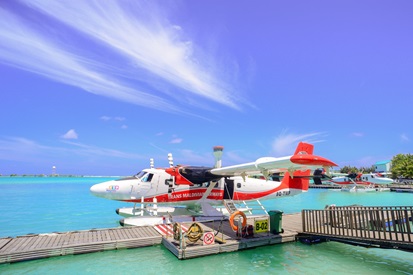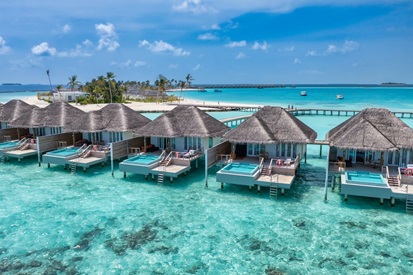

More than a million tourists enjoy a wonderful vacation in the Maldives every year. However, few people know that behind the external serenity and natural beauty of this region lies a number of serious environmental problems, including:
- erosion of the coastline;
- floods (caused, among other things, by the felling of mangroves, which provide natural protection for the islands from flooding);
- waste management and waste disposal (especially plastics);
- limited amount of fresh water;
- high population density and its uneven distribution across the islands.

Depositphotos
At the same time, one of the most serious threats to the Maldives is the rise in sea level due to global warming, which, according to experts, may lead to the fact that by 2100 the state will be under water.
In their speeches, the country's leadership has repeatedly focused on this problem and stated the need for additional funding to combat the effects of climate change.
More than 80% of the country's 1,192 islands are less than one meter above sea level, making the Maldives one of the most vulnerable countries in the world to water level changes. According to the observations of scientists, the ocean level is inexorably rising by several millimeters a year, which makes the island states sound the alarm and take measures to protect their territory.
One such measure is the construction of Hulhumale, an artificial island a few kilometers from Male, designed to reduce crowds in the capital. In addition, in the future, the new island may become a home for those who may have to leave their homes in the event of probable natural disasters.

Depositphotos
Hulhumale, created by pumping sand from the seabed onto a submerged coral platform, rises 2 meters above sea level and is designed to withstand the threat of rising water levels.
In addition, an important task for the country is to protect not only the housing of the population, but also critical infrastructure such as airports.
However, there are positive aspects that you should definitely pay attention to, according to some studies, reef islands made of gravel material can adapt to rising sea levels. According to scientists, this could allow for the maintenance of habitat on some islands in the near future, albeit with additional management challenges.

Hoodh Ahmed
The Maldivians themselves are very sensitive to the preservation of the environment. The schools hold appropriate classes for children, and local hotels pay great attention to the environmental education of tourists. Some resorts and guesthouses minimize the use of plastic in their everyday life, give lectures on respect for marine life, develop programs for the restoration of corals and invite both adults and young guests to participate in such programs.

Depositphotos
More articles
- Mauritius in Winter: Weather and Top Attractions
- Samosir Island in Sumatra: All About Vacationing
- The Maluku Islands in Indonesia: All About Vacations
- 10 Unique Facts About Indonesia
- Karimunjawa Island and National Park in Indonesia
- Indonesia's Natural Attractions: 13 Places Worth Seeing
- Nusa Dua in Bali: The Best Hotels and What to Visit
- Comment organiser un voyage aux Seychelles : 5 points clés
- Mentawai in Indonesia: All about the islands, how to get there, where to stay, and entertainment
- How much does a holiday in Mauritius cost – accommodation, food, and entertainment?



